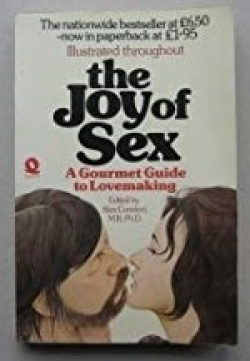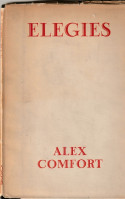The joy of poetry: first love of sex manual's author

I’d bought my second-hand copy of Penguin’s Poetry of the Forties anthology several years before, probably in Hay-on-Wye, but had never got round to properly reading it. This year, faced with a trip involving hanging around at airports, and needing something to read in the air, I bundled it with other similar volumes into my rucksack. I did read it, and came across a name there that was vaguely familiar; a poet called Alex Comfort.
I forgot about the name, amid flight delays and slip-road closures. But a few days later, back home, the penny dropped. Could this be the same Alex Comfort that had penned the 1970s bestselling sex manual The Joy of Sex? A quick Google told me that indeed it was. I needed to find out more.

But Comfort was so much more than a world-famous sex guru – indeed, he certainly rejected such a term. As well as being a poet, he was described in the Guardian obituary as a “physician, novelist, anarchist and pacifist”. Wikipedia describes him as “a British scientist and physician known best for his nonfiction sex manual, The Joy of Sex (1972). He was an author of both fiction and nonfiction, as well as a gerontologist, anarchist, pacifist, and conscientious objector.
Comfort was educated at Highgate school in London. While there, during experiments with gunpowder, he badly injured his left hand, losing several fingers. After studying medicine at Cambridge, he was a house physician for the London Hospital and later became a lecturer in physiology at the London Hospital Medical College.
He was an active member of the Peace Pledge Union and Campaign for Nuclear Disarmament, and a conscientious objector during the second world war. He was jailed for a month, with Bertrand Russell and other leading members of the Committee of 100, for refusing to be bound not to continue organising the Parliament Square/Trafalgar Square protest of 1961. He also devoted much time to studying the biology of ageing, believing that science could extend human lifespan.
But what about the poetry? Two examples of Comfort’s poetry are included in Poetry of the Forties, an anthology in which other, bigger names of the period such as Dylan Thomas, Alun Lewis, Keith Douglas, Sidney Keyes, David Gascoyne and George Barker feature much more prominently. He does not rate a mention in editor Robin Skelton’s introduction; on the other hand, his ‘From The Sleeping Princess’ is the last poem in the anthology.
His second volume of poems, Elegies, published by Routledge in 1944 (price five shillings), with its mythological references, shows the influence of TS Eliot: “I saw the dead flocking the Strand today” (‘Seventh Elegy’, a poem dated April 1943, and included in the Penguin Forties anthology). But there is also some fine and observant nature writing, as well as these lines:

her dark hairs gathered round an open rose
her pebbles lying under the dappled sea.
And I will ride her thighs’ white horses.
(‘For Ruth’)
To be honest, I feel a bit like a salacious schoolboy, searching for such quotes. There is not much else in that vein within Elegies. The flyleaf of the volume quotes the Times Literary Supplement on Comfort’s first volume of poems, A Wreath for the Living …”his sensuous awareness not only of people and things and nature but of the tragic undertone of his age is striking”.
A much later collection, Poems for Jane, launched in 1979 by his Joy of Sex publisher, does not mention the fame of his sex bestseller, but does say in the blurb: “They are primarily love poems … The frankness of his love poetry – prophetic in previous collections – is now happily no impediment to an appreciation of his humour, compassion and lyricism.” That same blurb quotes Donald Davie comparing him on equal terms with Robert Graves. There are a number of mythological references, as in his earlier collection, but the tone is certainly more relaxed and less high-blown, more conversational. Take ‘A Structural Detail Enlarged’, for example:

That woman’s made so well
Whose private parts combine
Orchid and smile and shell –
…
All things combined to make
This go so well with That.
Designed the ins and outs
Rugged but delicate -
Tested in daily use
That universal fit.
And the surrounding fleece
A touch of masterpiece.
Very Joy of Sex. However, this poem is not particularly typical, and fans of the sex manual that purchased Poems for Jane may well have been left feeling a little disappointed by its lack of eroticism. In another, untitled poem in the collection, Comfort reflects:
I wonder where the man I was is gone –
not here, not dead, not sleeping somewhere else.
I’ve shed his fears and many of his talents
Also his inexperience.
I could not write poems like his today.
At the time of publication of the 1979 collection Comfort was a consultant in geriatric psychiatry in Los Angeles.
In an interview with the Independent in 1995, at the age of 76, when he had been disabled by a stroke for several years, Comfort expressed the hope that he would be remembered most for his poetry: "Poetry is the thing that survives a man longest of all his efforts." In that interview, and in others, Comfort preferred to avoid talking about The Joy of Sex.
Ireland has come a long way since the late 20th century. But back then The Joy of Sex had been banned when it first appeared, and then re-banned in the late 1980s. In an article for the Irish Times, Jack Harte recounted how he had tried to persuade Comfort to get involved in a court challenge by the Irish Writers’ Union. Comfort demurred, but when Harte then suggested that he come over to Dublin to give a poetry reading instead, he accepted at once.
Harte said: “We circulated the media, of course, and they turned up in droves. Alex gave a stunning reading of his poetry, laced with references to his pacifism, to mathematics and quantum physics, to Sligo where he always experienced a spiritual hotspot in the ground. But not a word about sex. The packed audience was engrossed in this virtuoso presentation of enormous erudition. And of course the media gave the whole event major coverage, headlining the banning of his book. We achieved our objective. The bans were revoked shortly afterwards, and the Censorship Board went to ground again.”
Comfort’s words in The Joy of Sex are invariably calm, sometimes repetitive, and often humorous. He does like the occasional joke. Take this short extract headed Showerbath: “Natural venue for sexual adventures – wash together, make love together: only convenient overhead point in most apartments or hotel rooms to attach a partner’s hands. Don’t pull down the fixture, however – it isn’t weight-bearing. See Discipline.” For me, that’s a kind of poetry.
Alex Comfort was a staunch pacifist who could have coined the ‘Make Love, Not War’ slogan of the peace protesters of the 1960s. It won’t be long before we are marking the 50th anniversary of The Joy of Sex. Here’s hoping that at the same time there will be a new, collected edition of Alex Comfort’s poems, with a foreword that pays tribute to his full and multi-faceted career and life.
